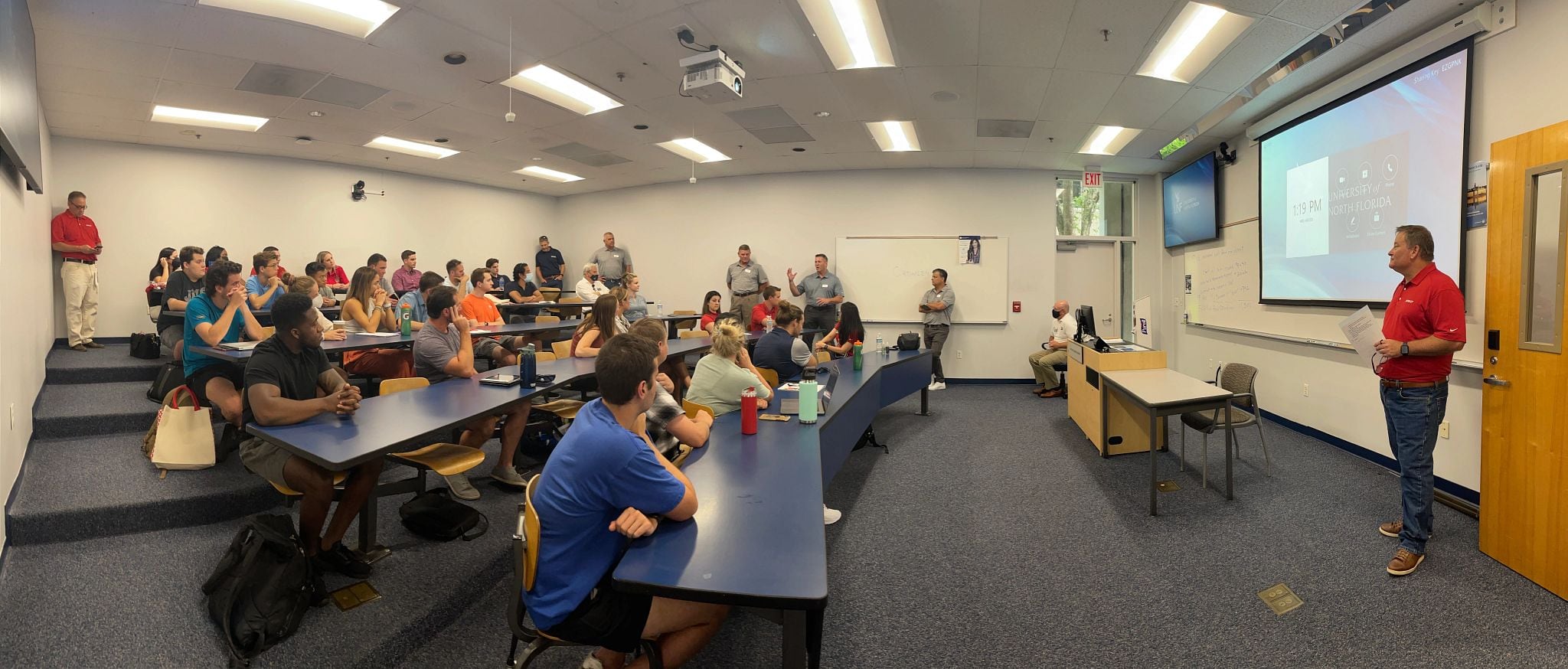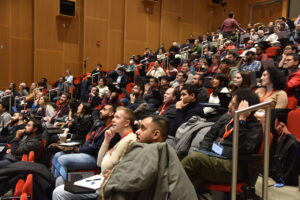Filling the Supply Chain Talent Pipeline

Private sector companies and organizations turn on the spout and team up with colleges and other educational institutions to raise the profile of a career in supply chain, bolster curricula, and help build tomorrow’s supply chain workforce.
For years, careers in supply chain and logistics too often were overlooked among those preparing to enter the workforce, and the educational curriculum of many colleges did not prioritize a logistics career path for their students. That is changing.
Supply chains used to be viewed “in the background,” but the pandemic raised the awareness of their importance and made them a priority in C-suites, says Steve Blust, president of the Containerization & Intermodal Institute.
As a result, supply chains and logistics have gained prominence at higher education institutions and their emphasis in curricula will only continue to grow.
There “absolutely” has been marked growth in supply chain curricula at higher education institutions, agrees Douglas Kent, executive vice president of corporate and strategic alliances at the Association for Supply Chain Management (ASCM).
“Just five years ago, the number of institutions that were offering a specialty or a degree in supply chain were far fewer than today,” Kent says.

Brett Bennett, senior vice president and general manager of Crowley Logistics, engages students at the Crowley Center for Transportation and Logistics with sessions on supply chain, sustainability, marketing, IT, and human resources.
Connecting with Students
It’s important for private sector organizations looking for supply chain talent to capitalize on that interest. That means seeking out opportunities to connect with students and show them the range of career possibilities. It also means partnering with schools to ensure that students receive the best-possible education and training to excel once they enter the workforce.
“There’s benefit to speaking to almost any student,” says Aleem Bandali, global head of Aim10x Executive Council at o9 Solutions, a Dallas-based enterprise AI provider that works with supply chain companies around the world. “It’s such a powerful topic that there’s value in teaching anyone who is willing to listen.”
It is crucial for industry members to be engaged in education and the development and advancement of future leaders. “There is much that companies can teach—connecting the rigor of education with the relevance of actual business practice is key,” says Jim Bender, manager, corporate citizenship for Crowley, a logistics, marine, and energy solutions company headquartered in Jacksonville, Florida.
“The pandemic had significant effects on the movement of cargo, and that’s why developing the talent pipeline throughout the entire supply chain eco-system is important,” Bender says.
“I recently served at a university and saw many students drawn to general business, accounting, economics, and business analytics,” he adds. “Supply chain management incorporates those programs, but in a more comprehensive way. It is the action behind the details.”
Meeting the Labor Challenge
In today’s highly competitive labor climate, developing the workforce is particularly critical so that supply chain organizations can meet the current demand for their services. The result has been higher engagement from industry.
“If your revenue is contingent on your ability to have the capacity to deliver goods and services to the people willing to spend, you don’t want a labor challenge to get in your way,” Kent says. “Corporations recognize that there is a labor shortage, and don’t want to be the last one out fighting for talent.
“Companies will get ahead of the game by making sure that they’re not only attracting talent but that they’re also growing talent to satisfy their needs,” he adds.
Supply chain planning is evolving rapidly, particularly as it relates to technology, and that means educators need help from industry to keep up.
“In universities and colleges, what students are learning by the time they’re learning it may not be as practical anymore,” Bandali says. “So it’s important for companies to partner with schools to help with that acceleration.”
There are clear benefits to industry and schools working together to share resources and insight, so that schools understand what industry needs and industry helps prepare the future workforce in the best way possible.
“By working together, they can optimize what’s being taught with what’s required in practice,” Blust says. “It’s a symbiotic relationship.”
It has never been more important for supply chain companies to engage with educational programs.
“The complexities and rapid changes in supply chain management are making it even more important for companies to stay in touch, stay current, stay relevant, and help provide the right education for the right people so that they, in turn, can provide the right services for their customers,” Blust says.
“Finding individuals who are able to deal with changes in technology and communications is important to stay relevant,” he adds. “Without communicating with the younger generation and knowing what’s going on, companies quickly can fall out of relevance.”

The Association for Supply Chain Management partners with the University of Toronto on a program that targets internationally educated professionals who immigrated to Canada with no prior supply chain experience.
Many Avenues of Engagement
Companies and organizations in the supply chain partner with educational institutions in a variety of ways.
o9 Solutions works with many different schools across the United States and Europe. For instance, the company works with the MIT Global Scale Network by sponsoring and providing data for a supply chain challenge and delivering guest lectures that focus on success stories and lessons learned.
Among the Containerization & Intermodal Institute’s academic outreach efforts is a highly active scholarship program that has run since 1992. The organization oversaw the granting of 46 scholarships to students at 12 different schools in 2022.
Crowley has supported funding and scholarships for maritime and logistics students who will be on board ships, designing vessels, managing technology and data analytics, and directing multimodal supply chains and their facilities.
Most prominently, Crowley’s partnership with schools includes a $2.5 million endowment to the University of North Florida for the Crowley Center for Transportation and Logistics at the Coggin College of Business. The center’s goal is to train students to enter the global supply chain workforce, Bender says.
Crowley participates by supporting faculty, visiting scholars, conducting industry research, pursuing federal grants and contracts, and recruiting students.
“This effort has resulted in innovative strategies and technologies as well as research underway to improve the industry,” Bender says.
ASCM creates workforce development content ranging from entry-level foundational education to supply chain professional certification. A key to successfully creating that content is analyzing what the market needs for practitioners to be successful and keeping up with new trends and developments.
Reaching new Team Members
The programs and audience for ASCM educational content can vary but together they illustrate the breadth of ways to reach potential supply chain team members. For instance, ASCM works with North Central Texas College to help equip immigrants from Mexico with the skills and background to work in logistics and warehousing.
Internships and apprenticeships are among the more powerful forms of outreach and can serve as “crystallizing opportunities for students,” says Amy Grat, CEO of EXP, a Southern California-based nonprofit that helps schools deliver career-based curriculum.
An internship can prove transformative for students, helping them gain new confidence and demystifying a career in the supply chain, she says.
Apprenticeships are where “the earning and learning become truly integrated,” Grat says, allowing students to enter clearly laid out career pathways with assurance. Companies that offer internships and apprenticeships reduce the skills gap for their new team members and help to create better-prepared, more confident workers.
Although supply chain companies that partner with schools often focus on two-year and four-year colleges and universities, many companies also see value in connecting with students earlier in their academic journeys.
There has been a “sea change” in understanding the need to provide more experiential opportunities for middle school and high school students so that they can “make better choices when they graduate,” Grat says.
In such a competitive labor landscape, waiting until college to reach students could mean waiting too long. “If you knock on their door in college, they might not answer,” she says.
“Supply chain companies are increasingly adopting the idea of dipping down into the earlier grades because the industry is graying and retiring,” Grat says.
“The skills needed to be successful in the supply chain are changing,” she adds. “It’s becoming much more data- and tech-heavy, so we need to either upskill current employees or move into that digital-savvy generation and compete for that talent.
“In a world with so many career choices and pathways that are much more complex than our grandparents’ generation, a sector like supply chain or logistics needs champions in the schools and it needs to create buzz,” she says.

It’s important for private sector companies to provide students with practical knowledge and real-world applications. For instance, students at the MIT Global Scale Network listen to a guest lecture from an o9 Solutions industry expert.
An Array of Benefits
Crowley sees investing in student-focused programs as enhancing the well-being and economic stability of its communities. Introducing students to the company and its industry also drives innovation and empowers culture at Crowley.
For the students, “not only do they experience shipping and logistics, but they also get to see our organization in action, and hopefully, decide to join the company,” Bender says.
“We need to carefully steward the resources in the communities we all share,” Bender says. “We want to see our support manifest itself in youth who understand the complexities of our industry and who collaborate inclusively.
“We want to engage with institutions that understand the need to collaborate and partner as we work together for a better tomorrow,” he adds.
Supply chain organizations that share fresh lessons straight from the real world prepare students to drive change in the industry when they arrive.
“It’s our responsibility to make sure students are armed with the best-in-class, latest and greatest knowledge,” Bandali says. “And not just the latest in theoretical knowledge and theoretical technology, but real practical applications that go with that theory so that they can challenge the status quo and help organizations move forward by bringing new ideas.”
Industry members can open students’ eyes to the wide-ranging supply chain career possibilities.
“Many students don’t realize what careers are available in supply chain,” Bandali says. “They hear the term supply chain and they know it’s important, but they don’t know what they can do.
“Almost every time I give a guest lecture, students will say, ‘I didn’t know you could do this,’” he adds.
It’s a Beautiful Thing
One of the “beautiful things” about supply chain jobs, Grat says, is that there is such a range of them and working in one job can provide excellent training for another one and provide the foundation for career advancement.
The supply chain sector can work to better show potential workers the long-term value of the skills that they learn in entry-level positions.
“New workers gain some critical competencies and skills that they can leverage to help them on a career trajectory,” Kent says. “We continue to try to position supply chain as a career option as opposed to a job because there are so many opportunities to learn.
“Typical warehouse workers gain skill sets that are beyond many industries at that level when they enter their career path,” he adds.
Leveraging New Skills
“We consistently want to remind students of how interesting the world of supply chain is,” he adds. “We also remind them that they can leverage the individual skills they gain early on, independent of what they decide to do from a long-term perspective.”
In addition to working with bachelor’s and master’s degree students, o9 Solutions has seen major benefits from working with executive education students. “They are the decision-makers and the real change agents within an organization,” Bandali says.“If you can reach and impact them, that will drive the biggest change for the industry.”
Students also provide fresh insight to the o9 Solutions experts who speak to them, asking questions that are “challenging and forward thinking,” Bandai says. They help the experts rethink assumptions and see things from new perspectives.
In the end, Bandali says, “Companies can learn from the students as much as we give to them.”
